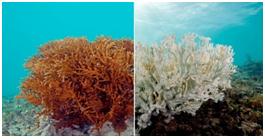

Coral reefs in the lagoon of the Seychelles’ Aldabra atoll have recovered faster after the 2015-2016 bleaching event due to tolerance to heat stress, as per new research published in Nature.
Context
Coral reefs in the lagoon of the Seychelles’ Aldabra atoll have recovered faster after the 2015-2016 bleaching event due to tolerance to heat stress, as per new research published in Nature.
About
- Aldabra, one of the world’s largest atolls, is a UNESCO (United Nations Educational, Scientific and Cultural Organization) World Heritage Site in Seychelles.
- It is located in the Indian Ocean.
- It comprises four main islands of coral limestone separated by narrow sea passages and encloses a large shallow lagoon.
- It is home to a population of endemic giant Aldabra tortoises, which fluctuate to around 100,000 more than the 95,000 population of Seychelles.
Coral Reef and Climate Change
- Climate change is the greatest threat to coral reef ecosystems.
- Ocean warming and associated coral bleaching are one of the foremost causes of coral loss across the world.
- Record-breaking high ocean temperatures, which occurred between 2014 and 2017, resulted in a prolonged and widespread coral bleaching, with the hottest temperature recorded (36.3 degrees Celsius) in early April 2016.
- Half of tropical coral reefshave been lost during the past three decades and even if temperatures were kept no higher than 1.5C, between 70% and 90% of reefs would be lost by the end of the century.
- The average global temperature is already 1C hotter than in preindustrial times.
- In addition, climate change is intensifying periodic weather phenomena, such as El Niño warming events, increasing the temperatures reefs experience and reducing the recovery interval between bleaching events.
- Climate models predict that global heating will continue over the coming century because our carbon emissions are expected to continue rising.
What is Bleaching?
- Bleaching is a process where corals lose their vivid colour and turn white.
- Coral exists in a mutually beneficial relationship with zooxanthellae algae, which live inside the coral’s polyps.
- The algae use the coral’s waste products and provide the nutrients to feed them both through photosynthesis.
- Higher sea temperatures force the coral to expel the colourful algae and, if this process is prolonged, the coral starves.
- During a coral bleaching event, reefs lose so much zooxanthellae that they become white and experience massive die-offs.
- Ocean acidification exacerbates the problem, eroding the reef, forcing corals to expend more energy building their calcium carbonate skeletons and slowing down their growth rate.
- If bleaching continues for an extended period of time, corals eventually die.
- Coral bleaching and mortality exacerbated by climate change are one of the biggest threats to oceanic biodiversity.
Significance of the findings
- The results showed that rapid reef recovery of coral reefs is possible.
- It highlighted that reducing local stressors to coral reefs can enhance their resilience against climate change.
- The study underlines the urgency to drastically reduce greenhouse gas emissions, as time periods between bleaching events are projected to become too short for recovery, even for highly protected and more resilient areas like Aldabra.
- With severe bleaching events expected to occur annually on 90 per cent of the world’s coral reefs by 2055, such research and long-term commitment to monitoring these valuable ecosystems is critical.



